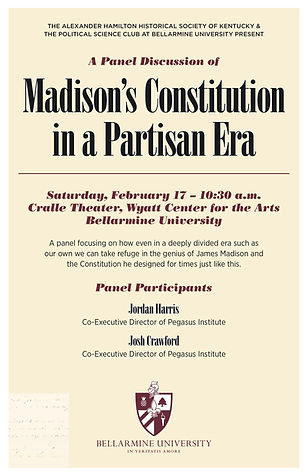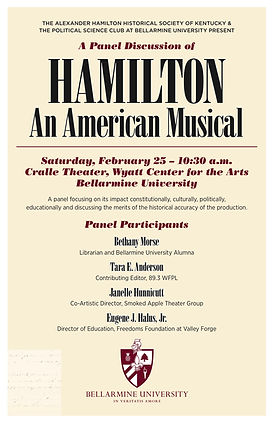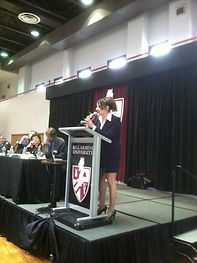ALEXANDER HAMILTON HISTORICAL SOCIETY of KENTUCKY
Meetings are held the third Saturday of each month at 10:30am. They are held in-person at the Masonic Home (3701 Frankfort Avenue; Artisan Room in the Meadow building; parking is easy). Please use the CONTACT page to reach us if you'd like to attend or have questions.
February 21, 2026
Constitutional Symposium
sponsored by
Bellarmine University
102 Pasteur Hall (new room location), Bellarmine University
10:30am
Speakers:
Jonas Hammond, Bellarmine University
Ethan Ballard, Bellarmine University
Speaking On:
by Jeffrey Rosen
A New York Times bestseller and an “enriching…brilliant” (David W. Blight, Pulitzer Prize–winning author of Frederick Douglass) examination of what “the pursuit of happiness” meant to our nation’s Founders and how that famous phrase defined their lives and became the foundation of our democracy.
The Declaration of Independence identified “the pursuit of happiness” as one of our unalienable rights, along with life and liberty. Jeffrey Rosen, the president of the National Constitution Center, profiles six of the most influential founders—Benjamin Franklin, George Washington, John Adams, Thomas Jefferson, James Madison, and Alexander Hamilton—to show what pursuing happiness meant in their lives, and to give us the “best and most readable introduction to the ideas of the Founders that we have” (Gordon Wood, author of Power and Liberty).
By reading the classical Greek and Roman moral philosophers who inspired the Founders, Rosen shows us how they understood the pursuit of happiness as a quest for being good, not feeling good—the pursuit of lifelong virtue, not short-term pleasure. Among those virtues were the habits of industry, temperance, moderation, and sincerity, which the Founders viewed as part of a daily struggle for self-improvement, character development, and calm self-mastery. They believed that political self-government required personal self-government. For all six Founders, the pursuit of virtue was incompatible with enslavement of African Americans, although the Virginians betrayed their own principles.
“Immensely readable and thoughtful” (Ken Burns), The Pursuit of Happiness is more than an elucidation of the Declaration’s famous phrase; it is a revelatory journey into the minds of the Founders, and a deep, rich, and fresh understanding of the foundation of our democracy.
February 22, 2024
Constitutional Symposium
sponsored by
Bellarmine University
Cralle Theatre, Wyatt Center for the Arts, Bellarmine University
10:30am
Speaker;
David C. Scott, J.D., Ph.D.
Assistant Professor of Philosophy
Director of Pre-Law at Bellarmine University
Speaking On:
Property Issues and the Law
“Nozick, Neighbors, and Nuisances — Anarchy, State, and Utopia at 50”
February 17, 2024
Constitutional Symposium
sponsored by
Bellarmine University
Cralle Theatre, Wyatt Center for the Arts, Bellarmine University
10:30am
Gerard N. Magliocca, who is the Samuel R. Rosen Professor at the Indiana University Robert H. McKinney School of Law, will speak on his new book Washington's Heir: The Life of Justice Bushrod Washington (Oxford University Press, 2022).
George Washington's nephew and heir was a Supreme Court Justice for over thirty years and left an indelible mark on American law. Despite his remarkable life and notable lineage, he is unknown to most Americans because he cared more about establishing the rule of law than about personal glory. An in-depth look at Justice Washington's extraordinary story that gives insight into his personal thoughts and sheds new light not only on George Washington, John Marshall, and the Constitution, but also on America's ongoing struggle to become a more perfect union.
Event Supported by the Jack Miller Center
2023 Symposium
Bellarmine University – Cralle Theatre, Wyatt Center for the Arts
Saturday, February 18
10:30am
Speaker
Ilya Somin
Professor of Law
George Mason University
“Judicial Review, Political Ignorance, and Voting With Your Feet”
With Constitutional Studies Student Panel Participants:
Megan Burger
Blake A. Duncan
Rees C. Jobe
Addie Rogers
Katy A. Williams-Duff
Events is free and open to the public.
Event is supported by the Jack Miller Center.
Description
Ilya Somin, Professor of Law at George Mason University, will speak on “Judicial Review, Political Ignorance, and Voting With Your Feet” drawing upon his books Free to Move: Foot Voting, Migration, and Political Freedom and Democracy and Political Ignorance: Why Smaller Government is Smarter. For the event, a select group of students were chosen to assist with the lecture and do an independent study on Constitutional Studies. The event is free and open to the public.
Critics of judicial review have long argued that it inhibits the will of the people, expressed through laws and regulations enacted by democratically elected officials. Thus, they claim, it should be used sparingly, or perhaps even not at all. This critique implicitly assumes that the political freedom of the people is best expressed through ballot box voting. Judicial review must therefore be kept within strict bounds in order to avoid infringing on democratic self-government. Ilya Somin challenges that assumption and instead suggests that political choice is often best expressed through foot voting, rather than ballot-box voting. That, in turn, strengthens the case for strong judicial review in a range of areas.
People can vote with their feet through international migration, by choosing what jurisdiction to live in within a federal system, and by making decisions in the private sector. All three types can be enhanced by judicial review. Instead of a singular collective “will of the people,” foot voting enables individual members of the public to pursue a wide range of policy preferences. As a result, it allows far more people to live under policies that they prefer, and reduces the disadvantages faced by minorities. Strong judicial review can facilitate foot voting in a variety of ways, both by enforcing structural limits on government power, and by protecting individual rights.
2022 Symposium
Bellarmine University – Cralle Theatre, Wyatt Center for the Arts
Saturday, February 12
10:30am
Speaker
Christopher R. Green
Jamie L. Whitten Chair in Law and Government
University of Mississippi School of Law
will discuss his book:
Equal Citizenship, Civil Rights, and the Constitution: The Original Sense of the Privileges or Immunities Clause
“The Privileges or Immunities Clause of the Fourteenth Amendment is arguably the most historically important clause of the most significant part of the US Constitution. Designed to be a central guarantor of civil rights and civil liberties following Reconstruction, this clause could have been at the center of most of the country's constitutional controversies, not only during Reconstruction, but in the modern period as well; yet for a variety of historical reasons, including precedent-setting narrow interpretations, the Privileges or Immunities Clause has been cast aside by the Supreme Court. This book investigates the Clause in a textualist-originalist manner, an approach increasingly popular among both academics and judges, to examine the meanings actually expressed by the text in its original context.”
****
2021 February Constitution Symposium (Virtual Lecture)
Saturday, February 13
10:30am
Zoom
Christina Mulligan
Vice Dean & Professor of Law, Brooklyn Law School
and author of "Diverse Originalism," 21 U. PA. J. CONST. L. 379 (2018)
will be speaking on
“Diverse Originalism"
Making originalism more inclusive and helping originalists become better at accessing the original meaning of the Constitution.
Constitutional Studies Student Panel Participants:
Olivia G. Atkinson
Rhianna P. Clemons
Aubrey N. Kirchhoff
Molly R. Rovinski
Biography
Professor Christina Mulligan teaches internet law, intellectual property law, and trusts & estates. Her research addresses efforts to adapt intellectual property law for the digital age, the relationship between law and technology, and theories of constitutional interpretation. Recently, she has written about the Internet of Things, robot punishment, and early translations of the Constitution.
While at Brooklyn Law School, Professor Mulligan researched as a visiting scholar at the Georgetown Center for the Constitution and taught as a visiting associate professor at Yale Law School. Previously, she taught at the University of Georgia and was a postdoctoral associate and lecturer in law at the Information Society Project at Yale Law School. Her scholarship has been published in a variety of journals and law reviews, including Georgia Law Review, SMU Law Review, and Constitutional Commentary.
Professor Mulligan earned her bachelor’s degree cum laude and her law degree cum laude from Harvard University, where she worked as a production and article editor for the Harvard Journal of Law & Technology. Before entering academia, she served as a law clerk for Judge Charles F. Lettow of the U.S. Court of Federal Claims.
Annual Constitution Symposium
at Bellarmine University
8FEB2020 10:30am
Frank J. Colucci
Associate Professor of Political Science, Purdue University Northeast
"Liberty and the Constitution"
Cralle Theatre, Wyatt Center for the Arts
Bellarmine University
2001 Newburg Road
Louisville, Kentucky 40205
Annual Constitution Symposium
23FEB2019 at Bellarmine University

10:30am
Lee J. Strang
Visiting Fellow, James Madison Program at Princeton University
John W. Stoepler Professor of Law & Values, University of Toledo College of Law
will speak on
“Originalism’s Promise: A Natural Law Account of the American Constitution”
Cralle Theatre, Wyatt Center for the Arts
Bellarmine University
2001 Newburg Road
Louisville, Kentucky 40205
A link to directions and a campus map: http://www.bellarmine.edu/admissions/campusdirections
-
The speech will be in building #4 on the map, the "Wyatt Center for the Arts"
-
There will be a big banner facing the parking lot that states “Alexander Hamilton Historical Society of Kentucky". Parking is free on the weekends.
Annual Constitution Symposium
17FEB2018 at Bellarmine University

25FEB2017 Symposium at Bellarmine University:
William E. Tho



attendees
Lynn Olympia, President of AHHS-KY
Lynn Olympia, President of AHHS-KY

Photos from 20FEB2016 Symposium at Bellarmine University:

sign up table






Photos from 14FEB2015 Symposium at Bellarmine University:
The panel.
Lynn Olympia of AHHS starts things off.
February 20, 10:30 am
*Bellarmine University Cralle Theatre*
William E. Thro
General Counsel, University of Kentucky
Adjunct Professor, University of Kentucky College of Law
Federalist No. 78 (Hamilton)
Judicial review: comparing the will of the people as expressed in the Constitution with the will of the People's Agents - the Legislature - as expressed in the statutes
Bellarmine University
2001 Newburg Road
Louisville, Kentucky 40205
On Newburg Road, you will go through the big arch on your right. Stay to the left of the construction when there is a split in the road.
Follow the road until there is a stop sign.Then take a right. There should be signs on the road pointing to the event on campus. It will be in building #4 on the map, the "Wyatt Center for the Arts" - there will be a big banner facing the parking lot that states "Alexander Hamilton Historical Society of Kentucky". Parking is free on the weekends. Coffee/Tea/Juice/Water will be served. A link to directions and a campus map: http://www.bellarmine.edu/admissions/campusdirections

Gunnar Kehrt-Reese doing the intro
for Prof. Tho


A good crowd.
Trent Apple talks about New York Times Co. v United States (Pentagon Papers, freedom of the press)
Asst Prof Williams discussing United States v Reynolds (executive privilege, state secrets doctrine)
Prof. Salamanca, Discussant
Jane Lollis talks about Youngstown Sheet & Tube v Sawyer (Pres. Truman's attempt to seize steel industry, power of the executive)
The Alexander Hamilton Historical Society of Kentucky
Pi Sigma Alpha (the National Political Science Honor Society) Alpha Theta Pi chapter, Bellarmine University
The Political Science Club, Bellarmine University
The Pre-Law Society, Bellarmine University
Present
Saturday, February 14th at 10:30am on Bellarmine’s campus (George G. Brown Center/Frazier Hall)
“The President’s Executive Power: When is it Constitutional?”
Moderator
Aaron D. Hoffman, Associate Professor of Political Science
Panelists
Eric P. Roorda, Professor of History
Lee Remington Williams, Assistant Professor of Political Science
Jane Lollis, Attorney at Law
Trent C. Apple, Attorney at Law
Discussant
Paul E. Salamanca, Professor of Law, University of Kentucky
Constitutional Panel Hosted By Bellarmine University
Bellarmine University’s chapter of Pi Sigma Alpha, Political Science Club, and Pre-Law Society will host a panel discussion to discuss the history of the President’s executive power on Saturday, February 14 at 10:30 a.m. in Frazier Hall.
The panel, titled “The President’s Executive Power: When is it Constitutional?” will include Bellarmine professor Eric P. Roorda (history) and assistant professor Lee Remington Williams (political science), as well as attorneys at law Jane Lollis and Trent C. Apple. Bellarmine associate professor Aaron D. Hoffman (political science) will be the moderator, and the discussant will be University of Kentucky professor Paul E. Salamanca (law).
The panelists will discuss several topics relating to executive power, which is outlined in Article II of the U.S. Constitution and in such laws as the War Powers Resolution of 1973, and executive privilege, which is the executive branch’s power to keep information confidential, often in the interest of national security.
They will examine the history of the President’s executive power, how our political system tries to balance executive power with the freedom of the press and the right to property, the roots of executive privilege in the Constitution, and controversies surrounding executive privilege. A question and answer period will follow the discussion.
This event is sponsored by the Alexander Hamilton Historical Society of Kentucky, and is free and open to the public. Lynn Olympia, president of the Alexander Hamilton Society of Kentucky, said, “Our goals with such an event are to promote a better understanding of the Founding Fathers' political philosophy, the genesis of the Constitution, and the resulting institutions required for effective government.”
Refreshments will be served.

